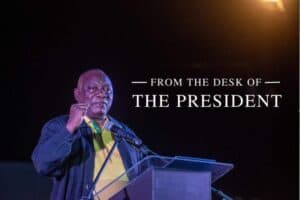The plan for Africa's top oil exporter assumes crude production of 2.18 million barrels a day and an oil price of $57 per barrel.

Nigerian President Muhammadu Buhari presented a record 10.33 trillion-naira ($33.8 billion) budget for 2020 to lawmakers on Tuesday as he aims to spur growth in Africa’s largest economy at the start of his second term in office.
The plan for Africa’s top oil exporter assumes crude production of 2.18 million barrels a day and an oil price of $57 per barrel, although an analyst said the budget implementation may “deviate dramatically” from the figures unveiled.
Nigeria emerged from its first recession in 25 years in 2017. Growth is still sluggish, although higher oil prices and recent debt sales have helped the country to accrue billions of dollars in foreign reserves.
Buhari told lawmakers at a joint session of the upper and lower chambers of parliament that the “economic environment remains challenging” but said the budget was expected to increase the pace of growth.
“The 2020 budget is expected to accelerate the pace of our economic recovery, promote economic diversification, enhance competitiveness and ensure social inclusion,” said Buhari, who won an election in February and began his second four-year term in May.
The president has repeatedly stated his desire to boost non-oil sources of revenue since crude oil sales make up around 90% of foreign exchange. Low prices were the main reason for the economy’s slide into recession in 2016.
Economic growth slowed to an annual rate of 1.94% in the three months to the end of June, the second quarter in a row of decline.
“We are optimistic of attaining higher and more inclusive GDP [gross domestic product] growth,” Buhari said.
The spending plan, which includes a value-added tax increase from 5% to 7.5%, is up from the 8.83 trillion-naira budget for 2019 and tops the previous record spending plan which was the 9.12 trillion-naira budget for 2018.
Buhari’s government has repeatedly rolled out record spending plans but struggled to fund them because of lower oil production and an inability to boost non-oil exports.
Actual revenue collection and budget implementation are likely to “deviate dramatically from the administration’s plans”, said Malte Liewerscheidt, vice president of Teneo Intelligence.
Buhari, who in his re-election campaign vowed to implement a road and rail construction programme, said 2.46 trillion naira had been allocated for capital projects and 2.45 trillion naira for servicing debts.
A budget deficit of 2.18 trillion naira – representing 1.52 percent of the estimated GDP – was to be financed through foreign and domestic borrowing, plus the proceeds of privatisation, he said.
The president said he would seek the support of lawmakers to pass two petroleum bills into law.
And he said he would resubmit a bill sent to parliament in 2018, which was not passed into law and which would review the fiscal terms for deep offshore oil fields.
“We estimate that this effort can generate at least $500 million additional revenue for the federal government in 2020, and over $1 billion from 2021,” he said.
Nigeria’s government is already in court with several international oil majors claiming “colossal” sums of money that it says it should have been paid under that law.
The budget must still be approved by parliament before being signed into law by Buhari, a process that can take months.
For more news your way, download The Citizen’s app for iOS and Android.






